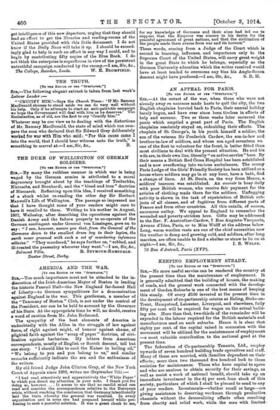AMERICA AND THE WAR.
[TO TEl EDITOR OP THR " Spwriroa."1
SIR,—Too much importance must not be attached to the in- discretion of the Irish-American Mayor of Boston in lending the historic Faneuil Hall—the New England far-famed Hall of Liberty—to German sympathisers for a demonstration against England in the war. This gentleman, a member of the " Tammany of Boston " Club, is not under the control of the President, nor can be be held to account by the Governor of his State. At the appropriate time be will, no doubt, receive a word of caution from Mr. John Redmond.
The sympathy of the best elements of America is undoubtedly with the Allies in the struggle of law against force, of right against might, of honour against shame, of plighted faith against the " scrap of paper " doctrine, of civi- lization against barbarism. My letters from American correspondents, mostly of English or Scotch descent, tell but one story. " I should like to cook the Kaiser in boiling oil," "We belong to you and you belong to us," and similar remarks sufficiently indicate the sex and the enthusiasm of the writers.
My old friend Judge John Clinton Gray, of the New York Court of Appeals since 1888, writes me (September 7th) :-
"I had read attentively and appreciatively the 'White Paper' to which you direct my attention in your note. I thank you for doing so, however. . . . It seems to me that no candid mind can read and consider the correspondence relative to the European crisis, without reaching the conclusion that Germany intentionally laid the train whereby the general war resulted. In every organization and in arms she had prepared herself while pro- fessing to seek a peaceful solution. It was a great shock to me,
for my knowledge of Germans and their aims had led me to suppose that the Emperor was sincere in his desire for the peaceful agreement of great nations, and that the civilization of the people made them averse from war and its horrors."
These words, coming from a Judge of the Court which is second in learning, influence, and importance only to the
Supreme Court of the United States, will carry great weight in the great State to which he belongs, especially as the German University education which the writer received would have at least tended to overcome any bias his Anglo-Saxon descent might have produced.—I am, Sir, &a., S. R. H.










































 Previous page
Previous page